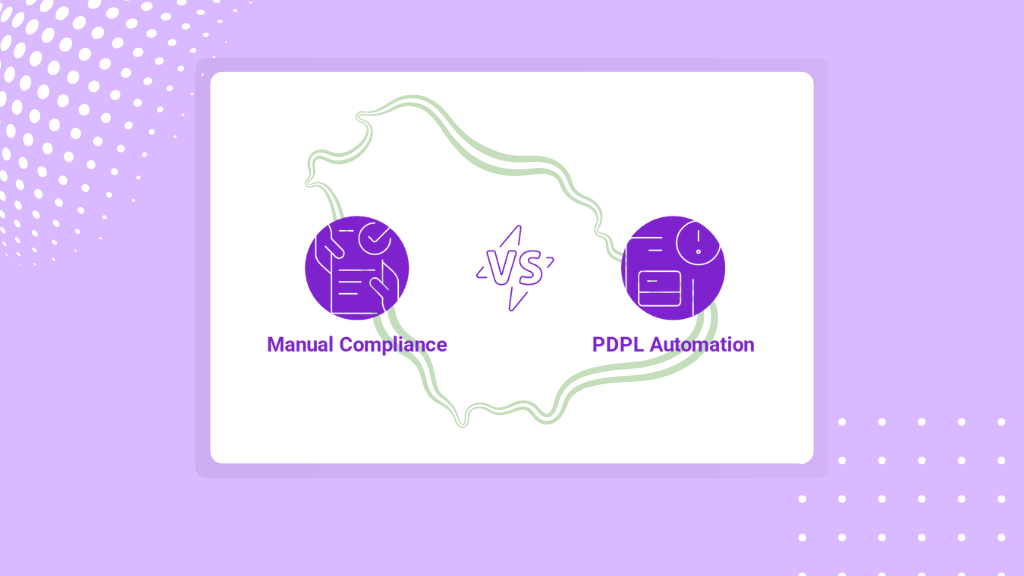In September 2024, Saudi Arabia’s Personal Data Protection Law (PDPL) came into full force. As a result, for businesses across the Kingdom, it marked more than just a regulatory milestone—it highlighted the urgent need to replace spreadsheets, scattered documentation, and manual oversight with scalable PDPL automation solutions. As the enforcement landscape tightens, companies are waking up to a new reality: manual compliance is inefficient and a liability.
Enter PDPL automation, the more innovative, faster, and more resilient approach to data protection in Saudi Arabia’s digital-first economy. Businesses across the kingdom are now turning to platforms like Sahl to transition from reactive compliance checklists to intelligent, future-ready governance.
The PDPL Shift: From Static Controls to Dynamic Expectations
Designed to align with international frameworks like the GDPR, the PDPL demands a comprehensive and proactive approach to privacy. It enforces:
- Explicit and informed consent
- Cross-border data transfer restrictions
- Timely breach notifications
- Documentation of processing activities
- Respect for data subject rights, including access, correction, and erasure
But while the law itself is written in legislative terms, its impact on operations is anything but abstract. As a result, organizations are now expected to demonstrate ongoing compliance during audits and at every point where personal data is collected, processed, or stored.
Consequently, that expectation has overwhelmed traditional manual systems. Human-led processes are not built for scale. When a customer invokes their right to erasure or a regulator requests processing records, delays are no longer tolerable; they are punishable.
Why Manual Compliance Fails in 2025 – And How PDPL Automation Solves It
Today’s data ecosystems are complex, hybrid, and fast-moving. Data flows across cloud environments, third-party platforms, internal tools, and employee devices. Most businesses can no longer answer basic questions like:
- Where is all our personal data stored?
- Who has access to it?
- What legal basis justifies its use?
- Can we prove our compliance in real-time?
In contrast, manual compliance methods—like disconnected systems, siloed spreadsheets, and emailed updates—were never designed to manage these questions at scale. They slow down breach responses, introduce risk, and erode trust. In contrast, PDPL automation tools from Sahl offer real-time visibility, automated controls, and verifiable audit trails that remove friction from compliance.
How PDPL Automation Gives Saudi Companies a Competitive Edge
Contrary to popular belief, automating compliance is not just about ticking regulatory boxes faster. It is about embedding privacy into the DNA of your operations without overwhelming your teams.
With Sahl’s PDPL automation capabilities, organisations can:
- Map and inventory personal data automatically, identifying where it resides and how it moves.
- Centralise consent management, ensuring only authorised data is used and revocations are honoured instantly.
- Trigger real-time breach alerts and automate 72-hour notifications to regulators.
- Generate Records of Processing Activities (RoPA) and fulfil data subject requests without delay.
- Align with PDPL executive regulations, including new expectations around anonymisation, retention, and cross-border data assessments.
This level of automation transforms compliance from a legal burden into an operational strength, enabling businesses to scale securely, respond confidently, and compete ethically in the digital market.
How PDPL Automation Sparks a Cultural Shift Toward Responsible Compliance
Indeed, PDPL automation is not just about tools—it signals a cultural pivot where data protection becomes everyone’s responsibility, not just the legal team’s. With proper training, executive buy-in, and real-time insights, teams can embed compliance into everything from onboarding and marketing to customer support and AI development.
Moreover, this proactive mindset aligns with Vision 2030’s broader goals fostering trust in the digital economy, empowering innovation, and attracting foreign investment. Compliance is no longer an obstacle to growth; it is its foundation.
Conclusion: A Compliance Future That Works
Saudi businesses face a clear choice. They can continue relying on legacy compliance methods and face rising costs, reputational risk, and operational fragility. Or they can adopt a smarter path: automated compliance built for scale, trust, and resilience.
Sahl is already leading this transformation, offering Saudi businesses the tools they need to meet PDPL demands with confidence. In a world where regulators demand speed, consumers demand transparency, and breaches make headlines, manual compliance is no longer enough. Automation is not just the future for PDPL; it is now.

👉 Learn more about Sahl’s PDPL automation platform and how it can help you stay compliant.



